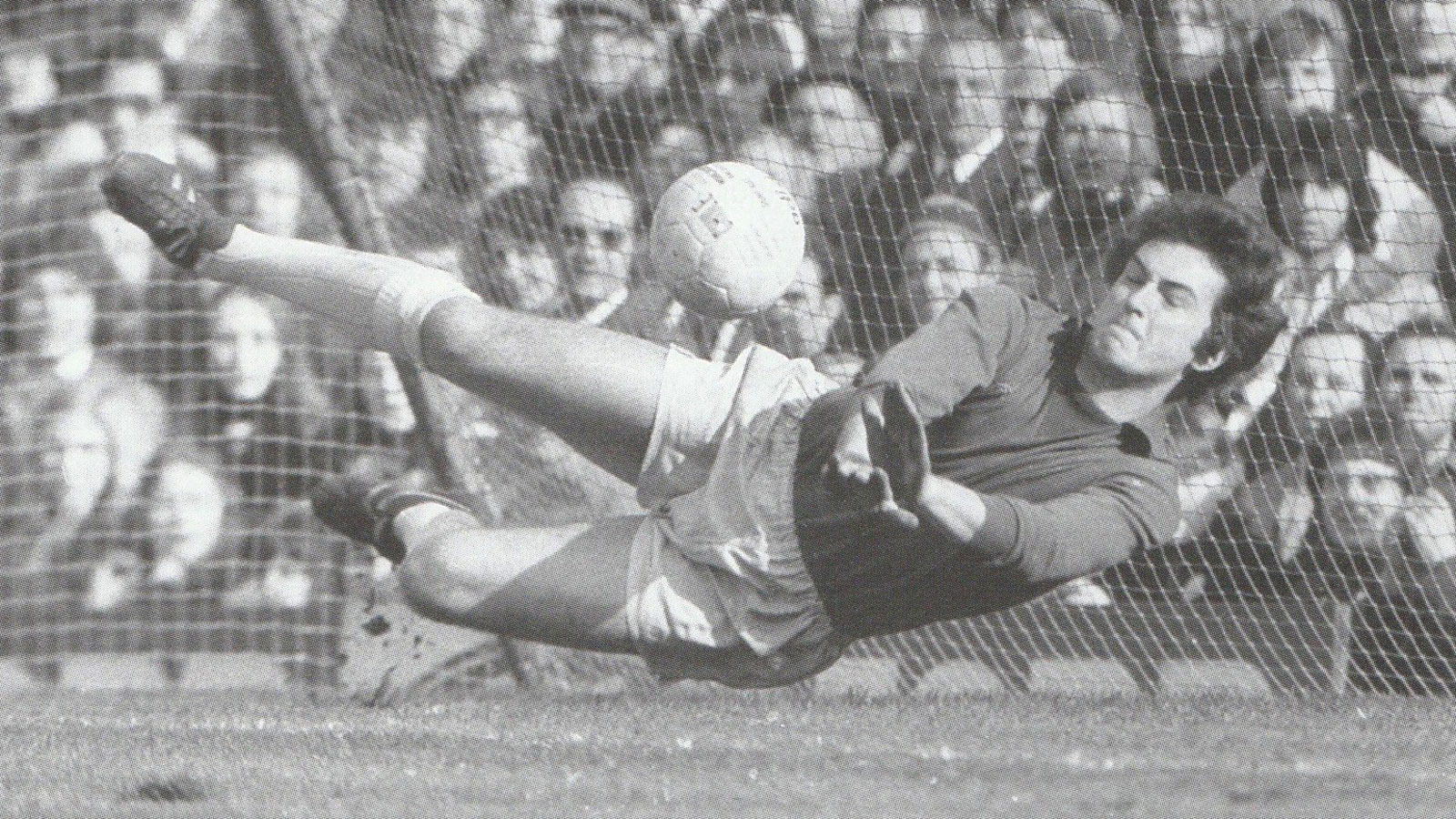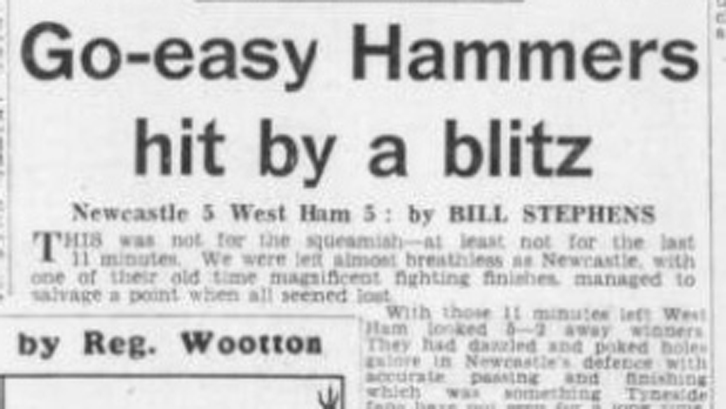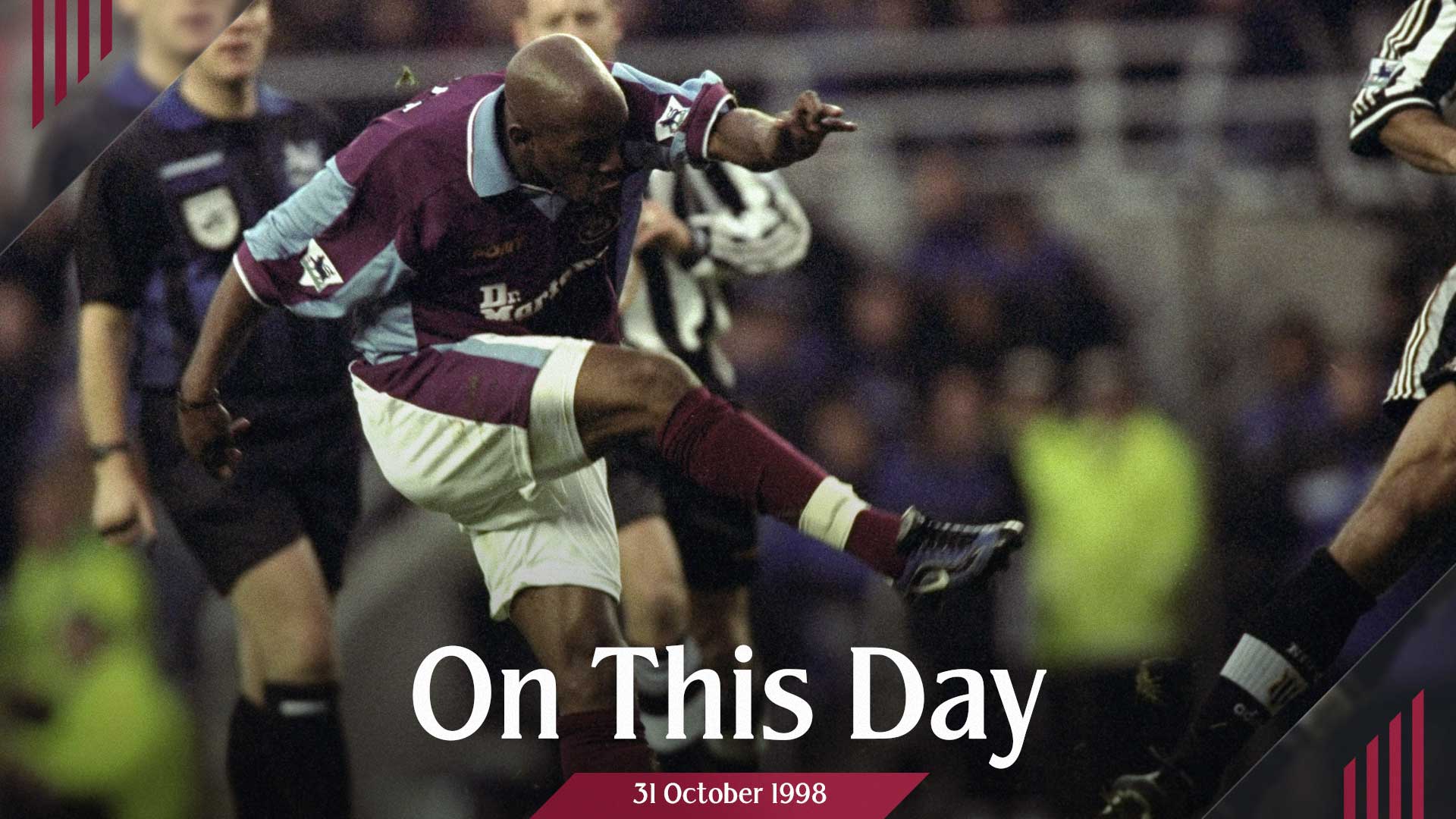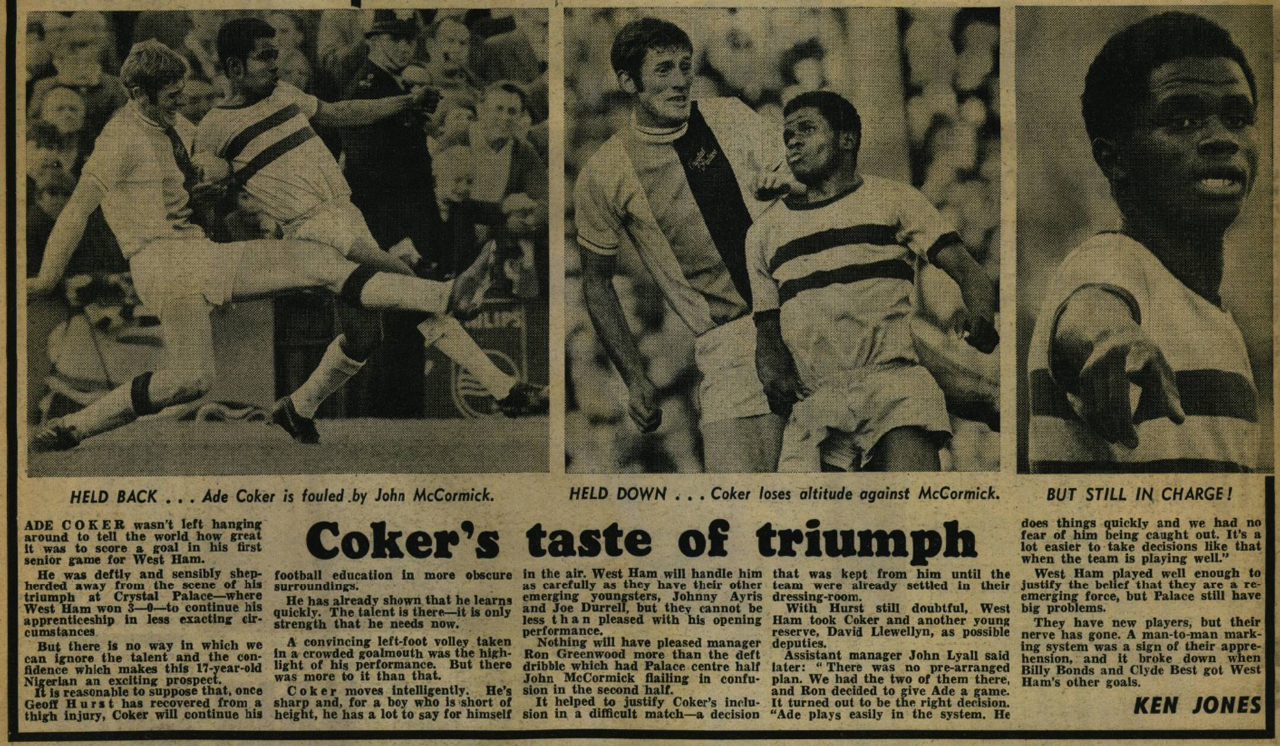As former West Ham United goalkeeper and coach Mervyn Day celebrates his birthday on 26 June, the 1975 FA Cup winner, who made 237 appearances for the Club, recalls the run to the 1976 European Cup Winners' Cup final the following season...
Euro Day-dream
My first two or three seasons at West Ham United flew by like a whirlwind. As a young, confident 19-year-old, I’d already been the youngest-ever goalkeeper to play in an FA Cup final and, having just beaten Fulham at Wembley in 1975, I never really thought that the Cup Winners’ Cup was going to be anything other than just another footballing adventure.
Nearly 50 years on, though, I now realise what a massive deal it is to play in Europe. Those opportunities don’t come around too often, especially at a Club like West Ham and, back then, you needed to either finish in the top four or win the FA Cup or League Cup to qualify.
In 1975/76, we started off with a trip to Finland, where we faced part-timers Reipas Lahden, who certainly gave us a scare, when they took the lead through someone who was even younger than me!
Harri Lindholm, a 17-year-old schoolboy, put them ahead and, although Trevor Brooking equalised, Reipas still went back in front. Thankfully, Billy Bonds then made it 2-2 on the night to give us two away goals to bring back to Upton Park.
The tie had been switched to Helsinki’s Olympic Stadium but there had still only been around 6,000 watching and we reckoned that the Finns wouldn’t be used to playing in front of what turned out to be a 24,131 crowd at the Boleyn Ground. But Reipas thrived on the Upton Park atmosphere and their ‘keeper made some brilliant saves to keep the second leg goalless for an hour.
Thankfully, Keith Robson then put us in front for the first time in the tie and, with the game slipping away, they now had to break forward. That left gaps for Patsy Holland and Billy Jennings to both score in the closing minutes and give us a somewhat flattering 3-0 victory. It’d certainly been a struggle at times but winning 5-2 on aggregate, we were now through to the second round.
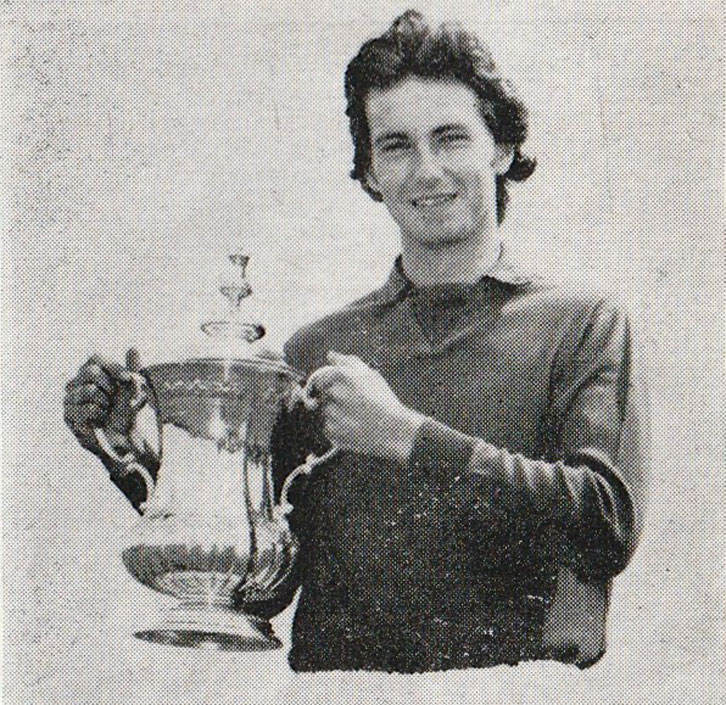
Day-light Robbery
We knew from that opening round that we needed to put in decent first-leg performances to keep ourselves in each tie. As it happened, we would be drawn away first in every round and, each time, we had the massive advantage of playing under those famous Boleyn Ground floodlights in front of our own passionate fans.
We now faced Soviet Cup winners, Ararat Erevan, and, flying from Stansted, we endured a three-hour-plus journey behind the Iron Curtain into Moscow. Once there, we had to wait through another two hours of document checks before boarding our connecting flight for the final 1,500 miles to Erevan, close to the Turkish border.
After that horrendous journey, we then discovered cockroaches in our hotel, forcing Mick McGiven and Keith Coleman to escape into the room I was sharing with Alan Taylor. Keith found a bit of space on Alan’s bed but there was no room for Mick on mine and he had to grab his sleep in a chair! Anticipating what 1970s Soviet Union would be like, the Club had, fortunately, brought its own food to Armenia, keeping everything as English as possible. We were all given an allowance, too, but with the authorities limiting us to around £15-worth of Russian Roubles, we couldn’t find anything to spend it on. It was a bleak, grey place and there was simply nothing to buy.
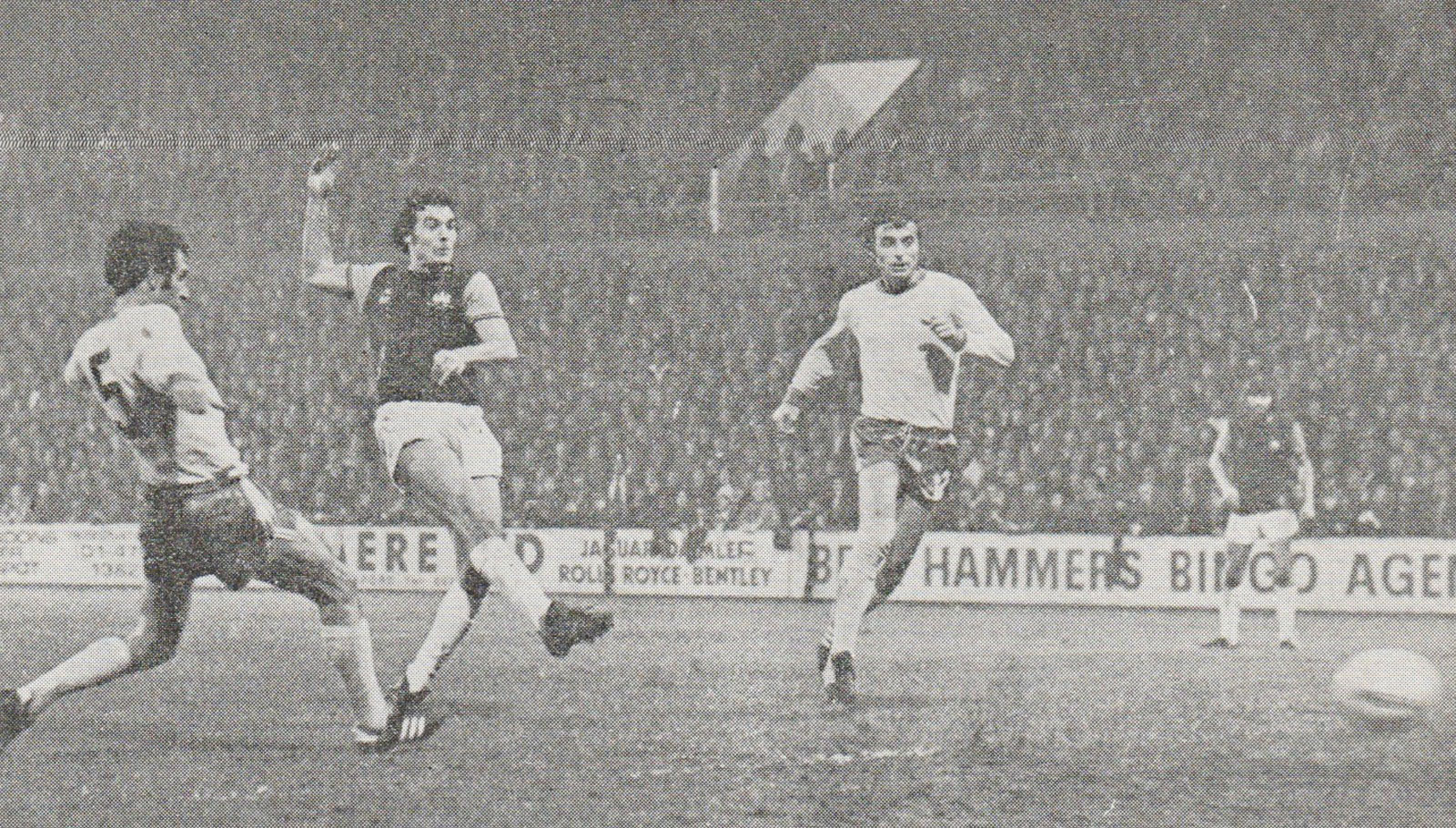
As our team coach approached the Hrazdan Stadium, though, it seemed totally out of context to anything else we’d seen. A fantastic football ground, it looked like it’d been built into the side of a mountain and, compared to those 6,000-odd fans in Finland, there were now 66,662 spectators inside the stadium. Alan silenced them when he put us ahead on the hour-mark but midway through the second-half, Erevan got an unbelievably, controversial equaliser.
I was holding the ball with BOTH hands, when their striker Samuel Petrosyan came around the side of me and headed it out of my gloves before tapping the ball into the empty net. I heard the referee’s whistle blow but it was to signal a goal! What? How did he allow that to happen? If ever there was a moment when we needed the VAR system then it was now!
Despite our anger, we’d still secured a 1-1 draw and, with another away goal, felt confident that the Boleyn Ground crowd would, once again, get behind us a fortnight later. It was a busy period both off-and-on the pitch. By the time the return leg came around, we’d beaten leaders Manchester United (2-1) at Upton Park to go second in the league, while – with it being the norm for clubs to encourage their players to wed young – I also married my fiancée Moira in late-October!
Now, on a wet and windy Guy Fawkes Night, we had to forget all about that first-leg controversy and concentrate on getting into the quarter-finals. Graham Paddon and Keith Robson gave us a two-goal lead before Erevan pulled an away goal back. But Alan calmed the nerves on a really muddy Upton Park pitch to give us 3-1 win on the night and a 4-2 aggregate victory that sent us into the last-eight.
Dutch Delight
Already four goals down against ADO Den Haag, it’s a massive under-statement to say that we were shell-shocked as we walked off at half-time in The Hague.
Back home, we’d slipped into mid-table by early-March, having been top of the league in early-November and, as holders were now out of the FA Cup, too. After those opening 45 minutes of the quarter-final first-leg, our season looked to be grinding to a sudden halt. If we felt that we’d been hard done by in Armenia, that was nothing compared to what we’d now just experienced in Holland.
Rudi Glöckner, the 1970 World Cup final referee, had made some terrible calls against us. After Dutch international Aad Mansveld opened the scoring, Mick McGiven was then somehow harshly adjudged to have handled. Mansveld scored from the spot before getting his hat-trick with another hotly-disputed penalty – the foul clearly being committed outside the area. Then, we stood in total confusion as the referee gave an unchallenged drop-ball, allowing the Dutch to break-away upfield and put the ball past me to make it 4-0 to Den Haag.
Now, we simply had to give it a go in the next 45 minutes because we had absolutely nothing to lose. Thankfully, Billy Jennings somehow grabbed two vital, second-half away goals to halve the deficit.
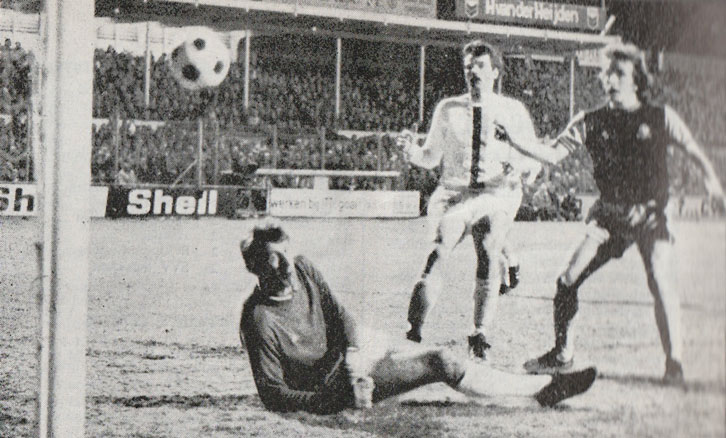
Many Dutchmen consider that 4-2 win at Zuiderpark Stadium to be the most memorable in Den Haag’s history and, when Alan Pardew and Chris Powell were managing the club during 2019/20, I went on a scouting mission to the Netherlands. Meeting them in reception before a match, I saw a massive action photograph covering the entire wall. Taken from behind the goal, it was a picture of Mansveld scoring one of his penalties and, with the young, 20-year-old goalkeeper diving towards the corner, all you could see in the foreground was a big backside. ‘Look, that’s me!’ I told Pards and Chris.
Back at Upton Park, we hit three goals inside eight first-half minutes through Alan Taylor’s tap-in, Frank Lampard’s rocket and Billy Bonds’ penalty. Den Haag pulled one back on the hour to make it 5-5 on aggregate and things started getting nervy towards the end of that second-leg but we held out to qualify on away goals.
It’s not often that you can claw back a two-goal first-leg deficit in European competition but was testimony to those Hammers fans that, yet again, they had more than played their part in helping us progress into the semi-finals. Considering what’d happened during those nightmare opening 45 minutes in The Hague, we’d certainly got ourselves out of jail.
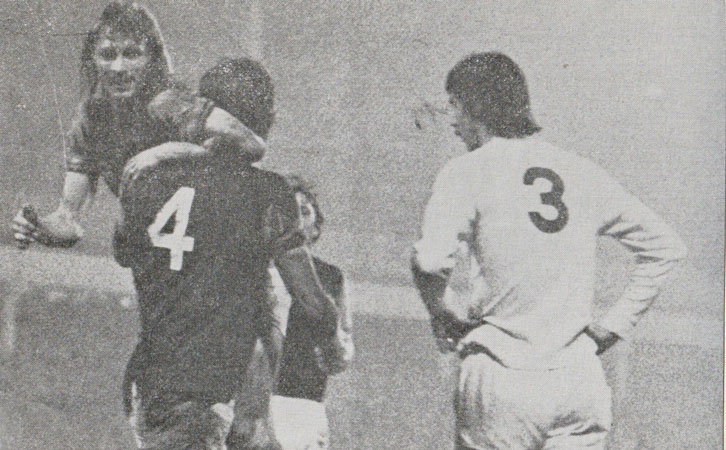
Boleyn Belter
Now into the last-four of the Cup Winners’ Cup, I began to realise just what a big deal it was to play in a European competition at all the different venues.
We’d travelled to Finland, the USSR and Holland and, arriving in West Germany to play favourites Eintracht Frankfurt, I thought: ‘Wow! This is massive.’ The Waldstadiom was a huge, bowl-like arena that held nearly 60,000 people but with an athletics track surrounding the pitch, those spectators were a long way from the action.
We knew that Eintracht were a very good side and were really pleased when we took the lead inside the opening ten minutes through Graham Paddon. And, although goals from Willi Neuberger and Wolfgang Kraus then gave the West Germans a 2-1 victory, we had another vital away goal in the bag. Once again, our away performance had kept us in the tie and, having come back from being four-goals down at Den Haag in the quarter-finals, we surely had chances in the return?
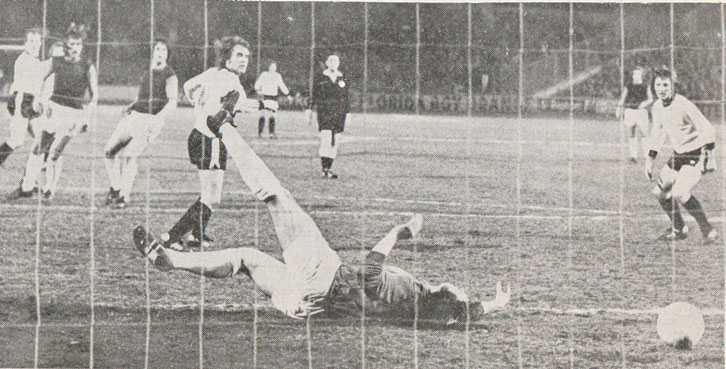
But I have no idea just how that second-leg was played. There’d been torrential downpours in the East End throughout the entire day and, when we arrived at Upton Park a couple of hours before kick-off, the groundstaff were desperately forking the pitch in a desperate bid to drain all the surface water.
I’ve replayed bits and pieces of the game over the years and it just looks worse and worse every time I watch it. That boggy surface made the night even more difficult for Eintracht, who now found the Hammers crowd almost on top of them, too. Here in London, there was no running track separating the players from the supporters and, in an intimidating atmosphere, we could see that the West Germans were scared.
The official attendance was given as 39,202 but, by my reckoning, on top of that reported number another 5,000 must’ve bundled in that night. Running out of the tunnel, the roar that greeted us was just unreal.
Trevor Brooking had one of the best games, if not the best, that he ever played for the Club and, after a goalless first-half, he headed us in front. Next, he sent Keith Robson racing clear and, although, the ball held up in the mud, Robbo recovered to hit a brilliant dipping 25-yarder under the far angle. Then, Trevor’s brilliant solo run made it 3-0 before Eintracht pulled one back, making it 4-3 on aggregate.
Score again and the West Germans would be through on away goals. It was end-to-end stuff but we defended well, while I made some decent saves all the rain and mud. When the final whistle blew there was a huge feeling of both relief and elation.
Once again, those brilliant West Ham supporters had played a massive part in keeping our European challenge alive and I know that many Hammers fans still choose that as their favourite game of all-time.
Without doubt, it was also one of the greatest matches, if not the greatest, that I ever found myself playing in across my 237 outings for West Ham United and an overall 750 games as a goalkeeper.
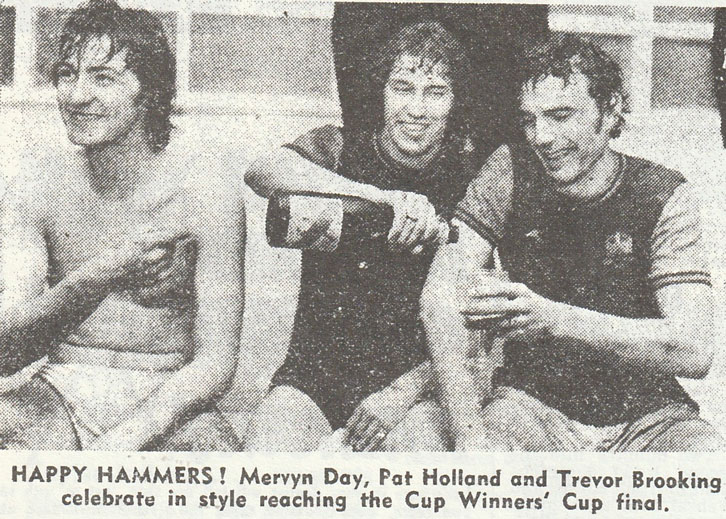
Final Fling
One year on from Wembley, we’d now reached the Cup Winners’ Cup final in Brussels, where we’d face Anderlecht on 5 May 1976.
Having been in that top-spot in early November, I really can’t put my finger on why we finished down in 18th – just two places above the relegation spots – with only one league win after Christmas.
Each time we played after a European game we were really poor. Perhaps it was the travelling? Perhaps it was the lack of time we had to prepare for our next game? Perhaps it was just down to that fact that, with our small squad and no ability to rotate, we had tired legs out there after putting in so much effort on those muddy midweek pitches?
The league season over, all our focus was now on that final at the Heysel Stadium. Playing in their home city, Anderlecht had a big advantage, but we started well in the Belgian capital, creating good chances and Patsy Holland slid us ahead on the half-hour mark. We were looking really comfortable in that first-half but just before the break Frank Lampard tore a muscle attempting his back-pass to me. Robbie Rensenbrink stole in to equalise and, early in the second-half, having now brought on Alan Taylor for Frank, we were still re-organising when [future Hammer] François Van der Elst put the Belgians ahead.
But we were still in the final and, after scoring that great goal in the semi-final, Robbo headed us level with a diving header. Back to 2-2, we had regained the momentum and, thanks to Robbo’s equaliser, were in the ascendancy.
I’d made a couple of decent saves, too, but with a quarter-hour remaining Patsy’s perfectly-timed tackle on Rensenbrink was somehow adjudged a penalty by the French referee and Anderlecht went 3-2 ahead. Decisions like that really affect you, especially in a major European final and, with 15 minutes remaining, we now had to get bodies forward.
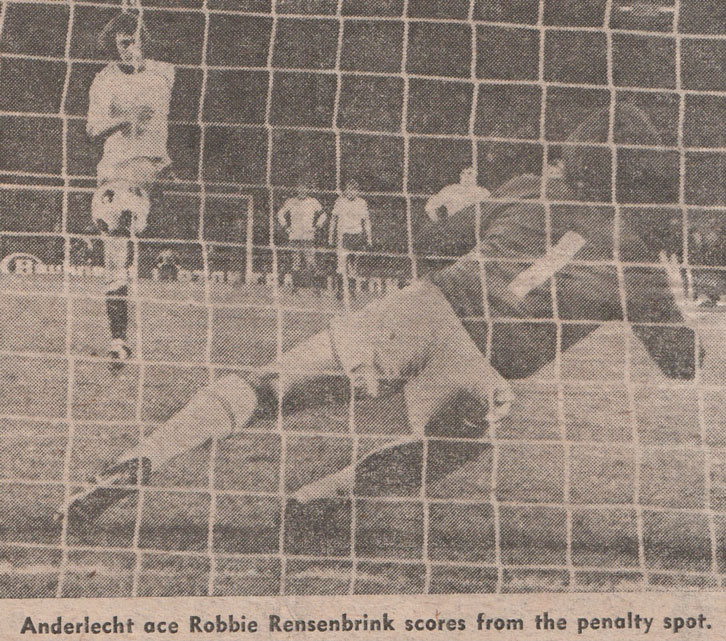
That dodgy penalty had left us chasing the game and, exposed at the back, we then saw Van der Elst break away to make it 4-2 in the dying moments. We’d pushed people out of position desperately trying to force another equaliser and, for me, that fourth goal was an irrelevance.
Small margins can always make a difference and, considering the things that went against us that night, 4-2 was certainly a false result. We would’ve loved to have matched the Hammers' triumphant 1965 team but it just wasn’t to be.
Although I’d kicked off that 1975/76 campaign thinking the Cup Winners’ Cup was just another tournament, having come so close to lifting the trophy, it became a real honour to represent West Ham United in Europe.
